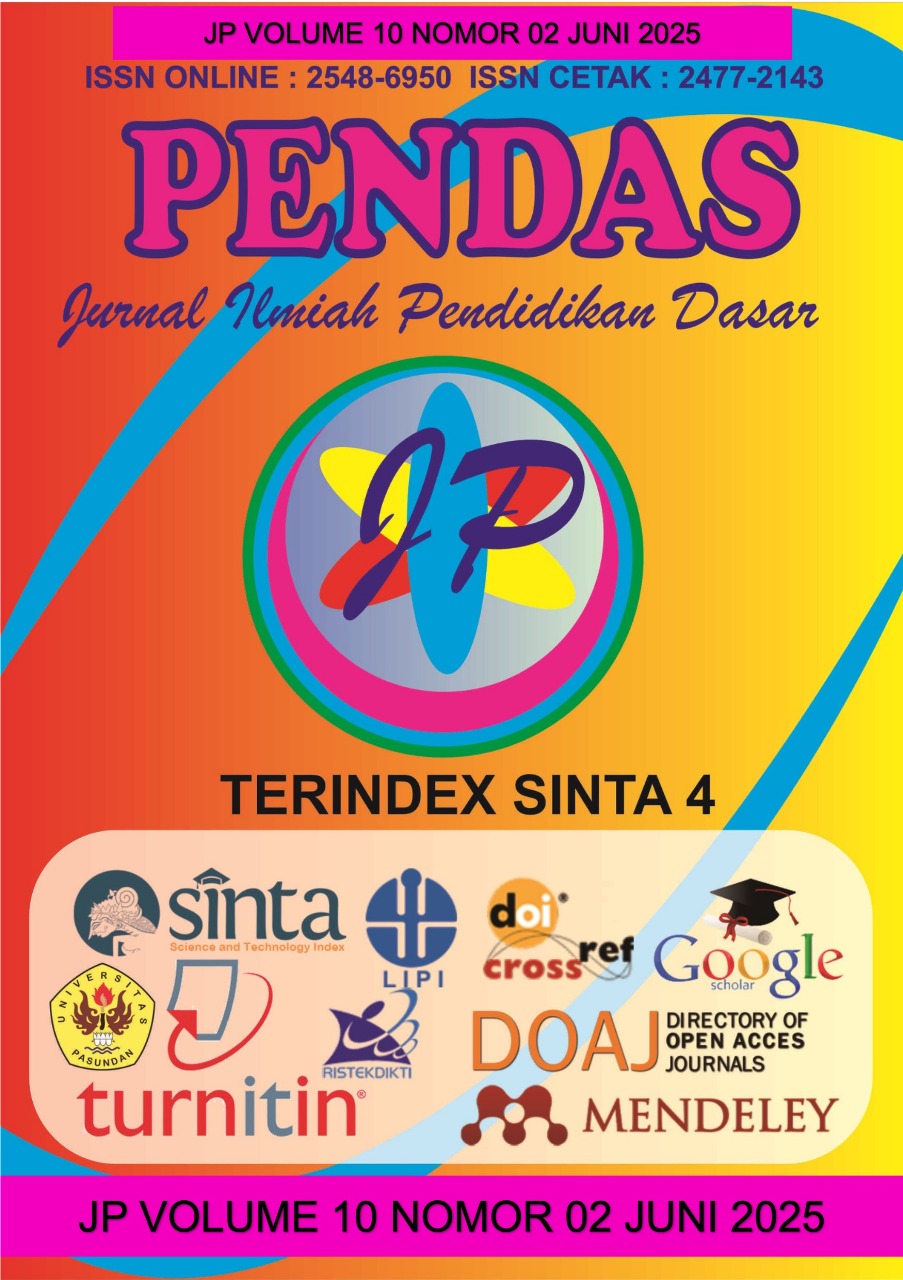PENGARUH RASA INGIN TAHU TERHADAP HASIL BELAJAR MATEMATIKA SISWA
DOI:
https://doi.org/10.23969/jp.v10i2.26657Keywords:
Curiosity, Mathematics Learning ResultsAbstract
The low mathematics learning outcomes of fifth grade students which are influenced by a lack of curiosity are the background for this research. This research aims to determine the effect of curiosity on the mathematics learning outcomes of fifth grade elementary school students on the volume of cubes and blocks. This research is quantitative research with a causal approach which aims to determine the effect of curiosity on mathematics learning outcomes. This research was conducted on class V students at Kotabatu 8 State Elementary School, Bogor, with a population of 81 students and a sample of 45 respondents. This research data was obtained through distributing instruments in the form of questionnaires for the curiosity variable and instruments in the form of questions for the mathematics learning outcome variable. The research results show that there is an influence of curiosity on mathematics learning outcomes with a regression coefficient (rxy) of 0.45 and a tcountof 3.32, while the coefficient of determination (r2) is 0.2025 or 20.25%. This means that 20.25% of students' mathematics learning outcomes are determined by curiosity through the regression equation Ý = (6.20 +0.55x) while the remaining 79.75% is determined by other factors. Based on the research results above, it can be concluded that there is a positive and significant influence of curiosity on mathematics learning outcomes.
Downloads
References
Ariyanti, G., & Santoso, F. G. I. (2020). Analysis of mathematics learning outcomes on senior high school students in Madiun City, Indonesia in COVID-19 pandemic. Journal of Physics: Conference Series, 1663(1). https://doi.org/10.1088/1742-6596/1663/1/012037
Evans, N. S., & Jirout, J. J. (2023). Investigating the relation between curiosity and creativity. Journal of Creativity, 33(1). https://doi.org/10.1016/j.yjoc.2022.100038
Fadilah, I., & Kartini. (2019). Identifikasi Sikap Rasa Ingin Tahu Siswa Terhadap Pembelajaran Fisika di MAN 1 Batanghari. Sukma: Jurnal Pendidikan, 3(2), 217–231. https://doi.org/10.32533/03205.2019
Harianja, J. K. (2020). Mengembangkan Sikap Rasa Ingin Tahu (Curiosity) Pada Pelajaran Fisika Menggunakan Model Pembelajaran Flipped Classroom. Jurnal Pendidikan Fisika Dan Teknologi, 6(1), 121–130. https://doi.org/10.29303/jpft.v6i1.1738
Hariyanti, F., & Lestari, W. 2023. Upaya Meningkatkan Rasa Ingin Thu Dan Prestasi Siswa Melalui Guided Discovery Learning Dalam Pembelajaran Matematika. Jurnal Penelitian Pembelajaran Matematika Sekolah, 7(JP2MS), 83–94. https://doi.org/10.33369/jp2ms.7.1.83-94
Hasan, H. (2021). Meningkatkan Hasil Belajar Matematika Melalui Penerapan Model Contextual Teaching And Learning Pada Era New Normal. Indonesian Journal of Educational Development, 1(4). https://doi.org/10.5281/zenodo.4560726
Kadek, N., Arini, A. D., Nyoman Murda, I., Ayu, G., & Agustiana, T. 2020. Korelasi Antara Rasa Ingin Tahu dan Motivasi Belajar dengan Hasil Belajar IPA Siswa Kelas V. Jurnal Mimbar Ilmu, 25(1).
Downloads
Published
Issue
Section
License
Copyright (c) 2025 Pendas : Jurnal Ilmiah Pendidikan Dasar

This work is licensed under a Creative Commons Attribution 4.0 International License.














































